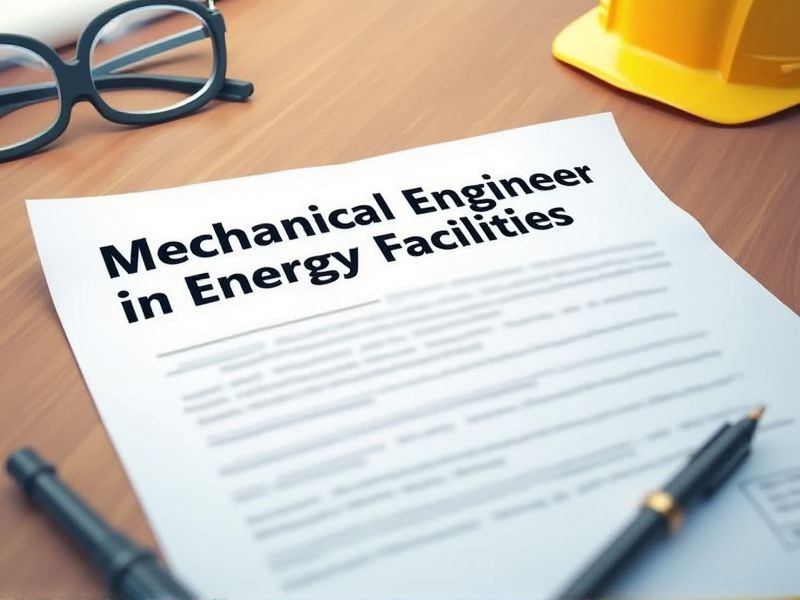
Mechanical engineers in energy facilities are tasked with designing, operating, and maintaining systems that are both efficient and compliant with industry standards. Certain certifications, such as those in safety and specialized equipment, ensure that engineers operate within regulatory frameworks and mitigate potential risks. These credentials validate expertise in essential areas like thermodynamics and fluid dynamics, ensuring optimal performance and safety. Explore these vital certifications for mechanical engineers working in energy facilities.
Professional Engineer (PE) License
Obtaining a Professional Engineer (PE) License ensures that a mechanical engineer possesses the requisite knowledge and skills to adhere to industry standards in energy facilities. The license acts as a quality assurance benchmark, building trust with employers and clients in complex energy projects. Legal requirements mandate a licensed PE to sign off on engineering work, mainly due to the potential risks involved in energy production. The PE designation can significantly boost career prospects and earning potential in this highly specialized field.
Certified Energy Manager (CEM)
Certified Energy Managers possess specialized knowledge that can significantly enhance energy efficiency in facilities. Mechanical engineers leveraging this expertise can optimize system performance, leading to reduced operational costs. CEMs enable better compliance with increasingly stringent energy regulations and standards. Enhanced energy management under CEM guidance can improve sustainability efforts and contribute to environmental goals.
HVAC Technician Certification
HVAC Technician Certification provides mechanical engineers with specialized knowledge in heating, ventilation, and air conditioning systems, which are essential components in energy facilities. This certification ensures that engineers understand regulatory compliance crucial for operational safety and efficiency in these environments. Advanced skills in diagnosing and repairing HVAC systems reduce downtime and optimize energy consumption. Accreditation instills confidence for both employers and clients that the engineer can maintain and enhance critical infrastructure.
ASME Certification
ASME certification ensures that mechanical engineers adhere to global standards, enhancing safety and reliability in energy facilities. This credibility can lead to increased trust from employers and clients, fostering more opportunities in the industry. Certified engineers are better equipped to design and operate systems that meet rigorous performance criteria, reducing the likelihood of failures. ASME's emphasis on continuous learning also keeps professionals up-to-date with technological advancements in energy engineering.
Project Management Professional (PMP)
A Project Management Professional (PMP) certification equips mechanical engineers in energy facilities with standardized project management skills, which enhance efficiency and consistency in project execution. Knowledge from PMP helps in effectively managing complex workflows and timelines critical in energy sector projects. PMP-trained engineers are better at risk assessment and management, reducing potential project setbacks and facilitating smoother progress. Possessing PMP credentials often increases professional credibility and can lead to advanced career opportunities within energy facilities.
Certified Reliability Engineer (CRE)
Certified Reliability Engineers enhance mechanical systems' durability through robust failure analysis, decreasing downtime in energy facilities. Their expertise in reliability prediction models helps optimize maintenance schedules, leading to cost savings. CREs implement risk assessment methodologies that mitigate potential operational hazards in energy systems. By ensuring equipment longevity, CREs contribute to sustainable energy production and regulatory compliance.
OSHA Safety Certification
OSHA Safety Certification reduces workplace accidents, lowering injury rates for mechanical engineers working in energy facilities. Compliance with OSHA standards ensures mechanical engineers adhere to essential safety protocols, enhancing operational efficiency. Certified engineers contribute to a culture of safety, crucial for maintaining regulatory compliance and avoiding costly penalties in energy sectors. Enhanced safety skills fostered by OSHA training lead to improved project timelines and reduced downtime from potential hazards.
Lean Six Sigma Green Belt Certification
Lean Six Sigma Green Belt Certification equips mechanical engineers with skills for process improvement, crucial in enhancing energy efficiency in facilities. Energy plants often face downtime and wastage; Green Belt techniques address these inefficiencies, optimizing operations. Implementing Lean principles can result in cost savings and reduced environmental impact, vital for sustainable energy practices. Engineers with this certification are better equipped to lead projects that align with energy facility goals of reliability and sustainability.
NICET - Mechanical Systems Inspector Certification
Mechanical engineers in energy facilities require NICET - Mechanical Systems Inspector Certification to ensure they possess up-to-date knowledge of safety standards and regulations. This certification provides validation of an engineer's ability to assess and maintain mechanical systems effectively, minimizing the risk of failures. Proper inspections guided by certified professionals lead to more efficient energy systems, reducing operational costs and improving sustainability. Certification assures stakeholders that mechanical engineers are qualified to handle complex systems, increasing trust and reducing liability risks.
NACE Coating Inspector Program (CIP)
The NACE Coating Inspector Program (CIP) is essential for mechanical engineers in energy facilities as it provides specialized knowledge to ensure proper corrosion protection, which is critical in maintaining the integrity of infrastructure. Inadequate coatings can lead to significant equipment degradation, which increases maintenance costs and risks operational downtime. By understanding coating application and inspection, mechanical engineers can contribute to increased safety and reliability of energy facilities. Improved expertise in coatings also helps meet regulatory compliance, further safeguarding the facility's operations against legal and financial penalties.
Summary
By obtaining certifications, you enhance your credibility and technical expertise in energy facilities. As a result, employers may view you as a more valuable asset, leading to increased job opportunities and potential for higher salaries. Your knowledge in specialized areas such as energy management and sustainable practices can also lead to improved efficiency within facilities. This development can significantly advance your career prospects and contribute to industry innovation.
